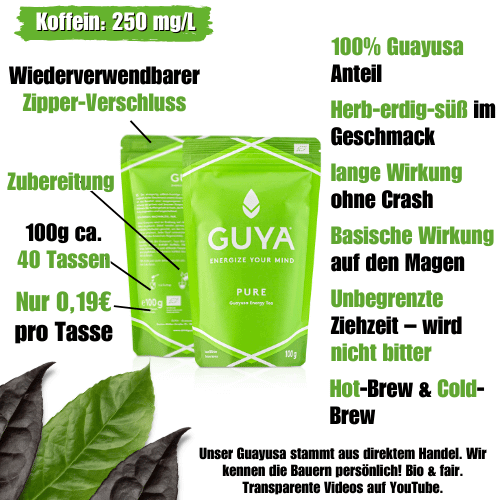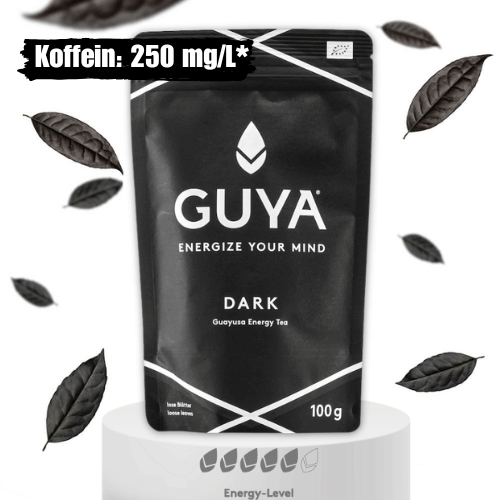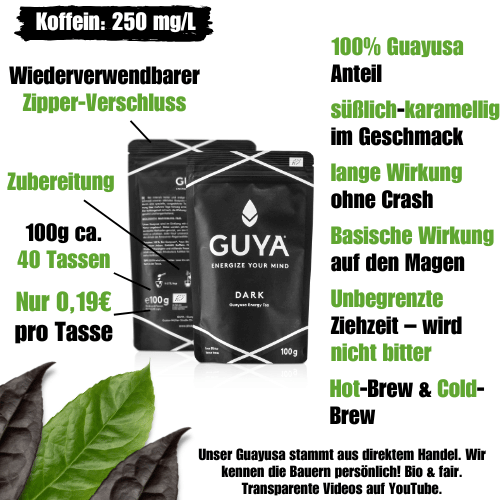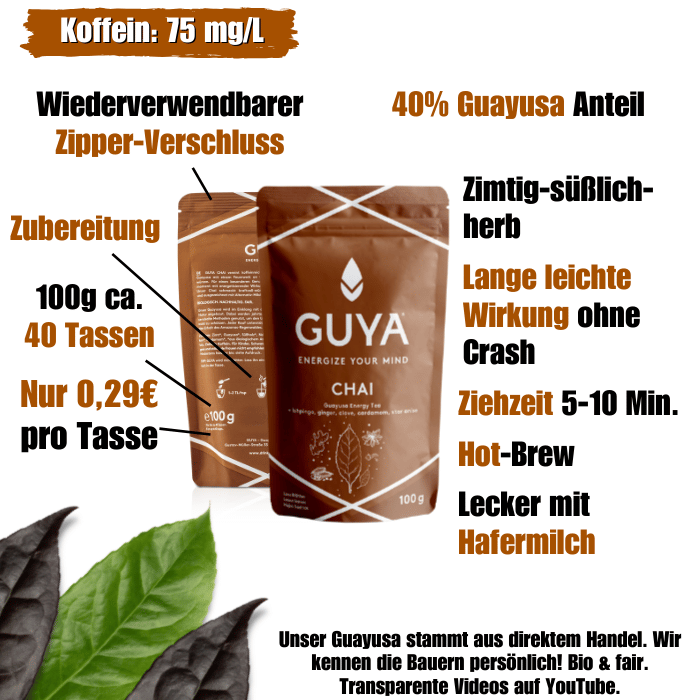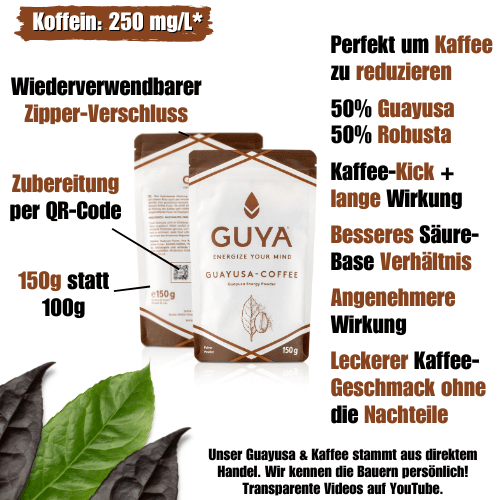10 tips – sleep better, perform better, live happier

Introduction
This article is all about sleeping better, making more performance in everyday life and generally happier to live. We would like to give you a few practical tips and tricks that help to be awake, focused, happy and powerful at 6 to 8 hours of sleep a day.
We from GUYA We have been dealing with topics of personal development and in the course of how we can make our lives more effective, more relaxed and fulfilling. Then Biohacking Is not just practicing a healthy diet!
Contents
1. Optimize to sleep better
We humans tend to optimize everything from A to Z, e.g. our sleep. Often to sleep less with the aim, but with quality yourself, so that you have more day hours to learn, work and do sports.
There are definitely some ways to optimize your sleep, but only reducing the bedtime, it is very likely that you can sleep better, nor to have more power during the day. As a result, you will not necessarily feel happier in life.
Adults usually need 7 hours or more per night, teenagers between 8 and 10 hours, Elementary and middle school students between 9 and 12 hours. Presumer, on the other hand, even up to 13 hours.
1.1. Can shorter sleep be better sleep?
Shorter sleep does not generally mean worse sleep. The optimization for better sleep begins beforehand. As soon as you have found the appropriate adjustment screws, a shorter bedtime can also be equally good.
However, it is very unlikely that you are clearly shortened in bedtime of z. B. can last for just 4 hours for more than a few days without getting sleep in. It is also not recommended in terms of health. One study With 10,000 participants, regular sleep deprivation from 8 to 4 hours makes the brain age by up to 8 years.
Sleeping significantly less than 7 hours over a long time can increase the likelihood of the following diseases:
- depressions
- Anxiety disorder
- diabetes
- stroke
- Increased blood pressure
- Psychoses
Only a few people get along permanently with less than 6.5 hours a night and still feel relaxed. Scientists have one for this mutated gene turned off.
Nevertheless, it is also possible without mutated gene to shorten your nights by improving the quality of your sleep. Read on to find out how you can do.
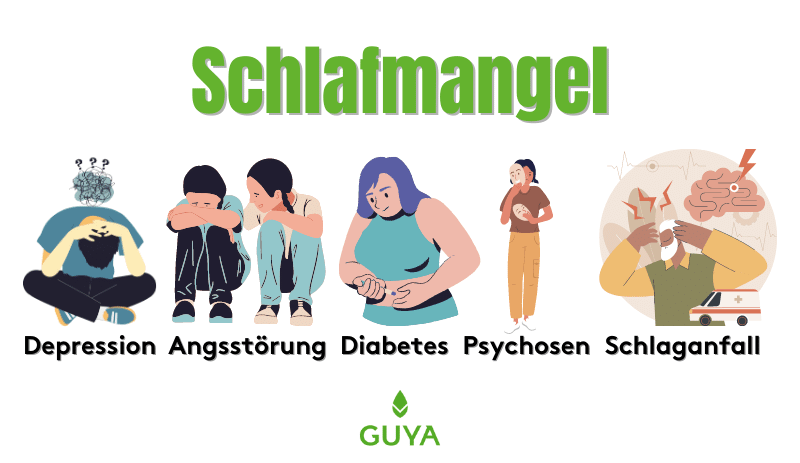
1.2. Does less sleep mean more time?
When researching, you will stumble across many different sleeping techniques that should enable you to sleep less if the sleep quality is constantly. Each of these techniques is certainly justified, but not every technology is also suitable for everyone.
Ultimately, you have to find out for yourself what fits best. Every sleeping technique works. But keep in mind that more time only makes sense if you have more or at least as much energy as before during this time. Half of the time tired to spend with unclear and confused thoughts does not help you, because then you have less performance instead of more power than before.
With a bedtime of more than 8 hours, the sleep hormone melatonin can still be found in the body during the day, which results in a slight tiredness throughout the day, which also applies to sleep times of less than 6 hours. About 7 hours are optimal for most people.
2. 10 tips better to sleep
- A little workout: Sport promotes blood circulation and can make you feel more alert, but sport helps that your body falls into a rest mode faster.
- Reduce screen time: 30 to 60 minutes before going to bed you should avoid your smartphone and laptop. The blue light disturbs your melatonin household and your circadian rhythm.
- No screens in the bedroom: Mount it to have your cell phone next to your bed. Push news may take the screen in the middle of the night. Panel strips with light, TV and other electrical appliances also worsen sleep.
- As dark as possible: Your sleep gets better the darker your bedroom. Street lamps or other lights let you sleep less deeply.
- Less caffeine: Reduce your caffeine consumption from 12 p.m. More to Additional caffeine but also Side effects as well as an extensive overview of the active ingredient caffeine can be found in the linked articles.
- Fit healthy: A healthy diet helps your body to quickly absorb the energy of food. Avoid particularly serious meals and do not lie down immediately after the last meal, but digest 1 to 3 hours.
- Avoid alcohol: Alcohol hard a negative impact on your central nervous system and does not help you to sleep better.
- Don't drink too much before bedtime. So you avoid any toilet at night.
- Go for a walk: Sunlight and oxygen are healthy for our body and help to sleep healthier and better.
- Power-nap: If you are often tired during the day, try a power nap of 20 minutes.
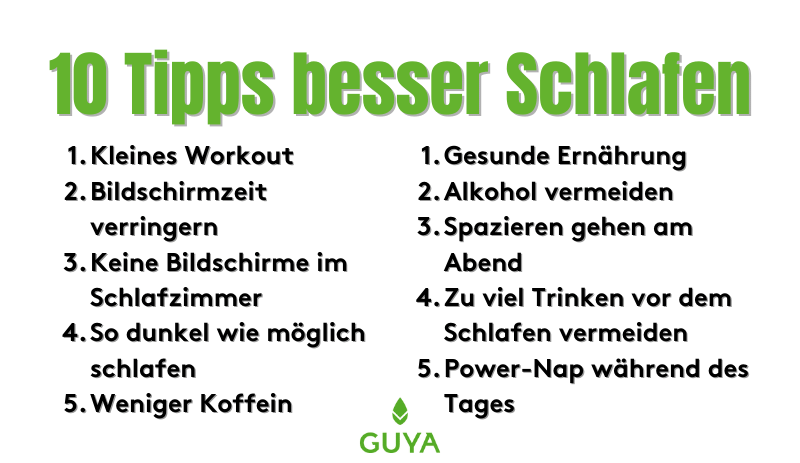
2.1. Multi -phase / polyphasic sleep
A often discussed sleeping technique is that of multi-phase sleep. Six 20 minutes sections will be distributed over 24 hours, in which a power NAP takes place.
There are no studies that show that this technique is without negative consequences, but there are many advocates of this technology.
If the everyday life that may not be stressful, this technology should enable top performance despite the enormous lack of sleep.
2.2. Sleep by indigenous people
Researchers have found that primeval peoples have a much shorter sleep phase than "civilized peoples". They also do not suffer from any sleep disorders and, despite the shorter sleep phase, are extremely fit during the day. They usually go to bed a few hours after sunset and wake up again before sunrise.
Why is that?
Urban is exposed to the outside temperature, which is why the light plays a secondary role in their wake -up phase. The temperature that reaches its lowest point before sunrise is decisive.
In this country it is exactly the other way around. In our mostly constant warm apartments, waking up is more and more regulated by the sunlight (or the alarm clock). Our daily bedtime in Germany is 8.3 hours, and almost 9 hours in France. On the other hand, that of the original peoples only a little more than 6 hours.
In this article, this article is "Get up early & have more energy!"Described.
Is the trick for sleeping better, happier life and more performance have that to spend your sleep in the wild? Perhaps! But who is already able to do this these days, and very few really want that.

2.3. Sleep better despite caffeine
The consumption of caffeine in the afternoon or in the late evening can lead to a deterioration in sleep.
Usually the adenosine level increases throughout the day and makes us tired. Caffeine keeps us awake by setting the adenosine receptors in the brain, but, unlike adenosine, they do not activate them. That is why you have more mental performance after drinking a security guard.
If you drink coffee too late, you will be difficult to switch off in the evening, even though the body is already tired.
It is therefore important not to drink coffee again about 6 hours before going to sleep.
Guayusa behaves a little differently here, since the active ingredient also L-theanin It contains which our brain swing in the area of alpha waves. Guayusa So it allows you to fall asleep, even if you drank your last cup after 12 noon.
Nevertheless, it is only recommended large quantities Guayusa to drink before going to sleep when you dream of lucid want.
3. Sleep better and live happier
Sleeping better, living happier and having more performance are essential things that everyone wants for their life.
A mindset hack that can help you wake up in the morning more relaxed and thus have more performance directly, is the setting of goals and smaller to-dos the day before for the following day.
Always think about going to bed in front of what you want to do the next day. This procedure enables the subconscious to switch off the subconscious at night, or to deal with the goals set.
What the mind no longer does is to deal with the powerful question: "What do I have to do tomorrow?".
Therefore, sit down some destinations or to-dos for the following day.
3.1. The brain while sleeping
For a healthy sleep are more Brain areas involved when you might accept.
- Hypothalamus and nucleus suprachiasmatic (SCN): In the hypothalamus there is a cluster of nerve cells, which is called nucleus suprachiasmaticus. This area in the brain is essential for healthy sleep. He receives light information directly via the eyes to determine whether it is day or night. If the SCN is damaged, this information cannot be processed and the circadian rhythm is disturbed. Such people sometimes sleep more often during the day.
- The brain stem communicates with the hypothalamus to control the sleep-wake rhythm in the brain. Both produce a chemical called GABA. GABA reduces the activity of both brain areas for sleep. The brain tribe also plays an important role in relaxing the muscles, so that during the REM phase we do not perform our dreams through movements.
- The thalamus is the center for sensory impressions and is mostly inactive during sleep. In the REM phase, however, this area sends our Cerebral cortex, which takes over the processing of long and short-term memory, all sorts of impressions such as pictures, smells, feelings and noises that enliven our dreams.
- The stone gland Also receives signals over the day-night rhythm of SCN to then produce the hormone melatonin. People who have a disturbance can therefore supplement melatonin to manually control the rhythm. However, this is also a popular one Biohacking method Healthy people. Scientists are pretty sure that this is important for a healthy and better sleep.
- The basal front brain is responsible for the production of adenosine, which accumulates in the brain throughout the day and informs about the exhaustion of the body in the evening and thus makes you tired. caffeine prevents this process.
- Amygdala is an area in the brain that is involved in storing information and processing emotions. During the dream phase, this area becomes very active and helps the brain to process experiences of the day in sleep during the REM phase.
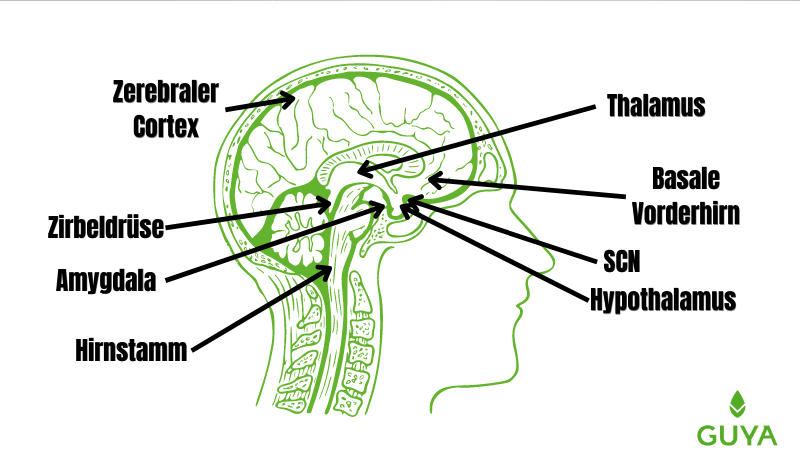
4. Conclusion
Our sleep contributes a large part to our daily performance of the brain, and in general of the body and a happy life. Anyone who has sleep problems only knows this too well. Lack of sleep can have enormous health consequences.
We hope that our 10 tips, the general overview of the brain functions during sleep, as well as the facts will help you to be able to sleep better in the future.
If you consume a lot of caffeine in your everyday life, the limitation of the morning hours can help improve your rhythm. Alternatively, instead of coffee or Energy drinks also Guayusa drink. Guayusa reinforce your cognitive skills without negative side effects.

















